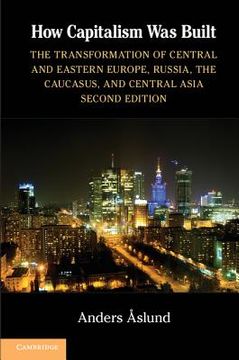Share
how capitalism was built: the transformation of central and eastern europe, russia, the caucasus, and central asia
Anders Aslund
(Author)
·
Cambridge University Press
· Hardcover
how capitalism was built: the transformation of central and eastern europe, russia, the caucasus, and central asia - Aslund, Anders
Choose the list to add your product or create one New List
✓ Product added successfully to the Wishlist.
Go to My Wishlists
Origin: Spain
(Import costs included in the price)
It will be shipped from our warehouse between
Thursday, June 27 and
Monday, July 08.
You will receive it anywhere in United Kingdom between 1 and 3 business days after shipment.
Synopsis "how capitalism was built: the transformation of central and eastern europe, russia, the caucasus, and central asia"
Anders Åslund is known to make bold predictions that initially arouse controversy but soon become common wisdom. In his book Gorbachev's Struggle for Economic Reform (1989), he foresaw the collapse of the Soviet political and economic system. When others saw little but chaos, he depicted the success of Russia's market transformation in How Russia Became a Market Economy (1995). After Russia's financial crisis of 1998, although most observers declared the market economic experiment a failure, Åslund foresaw market economic success (Building Capitalism, 2002). In How Capitalism Was Built, Second Edition, he asks - and answers in depth for the twenty-one countries he investigates: - Why did communism collapse? - Why did Russia not choose gradual reforms like China did? - Wherein lies the relative success of postcommunist transformation? - How did the oligarchs arise and decline vis-à-vis authoritarian leaders? Anyone who wants to understand the often confusing postcommunist dramas and to obtain an early insight into the future will find this intellectually stimulating book useful. The second edition includes updates to each chapter as well as new chapters on the impact of the global financial crisis and the European Union on the region.

